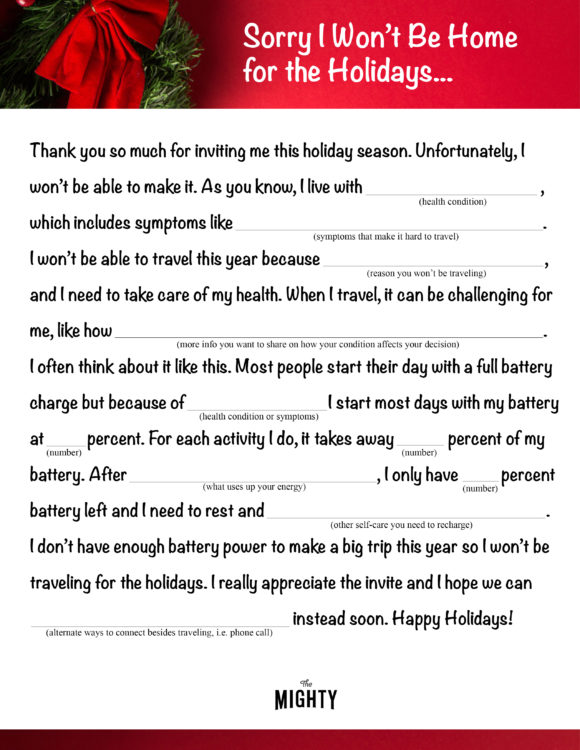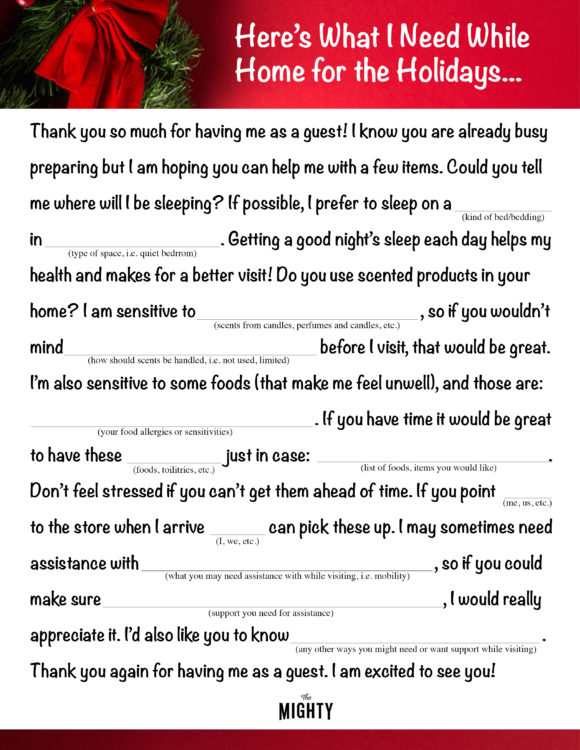Here's How to Communicate Your Holiday Travel Needs and Limitations
As the holidays approach, it’s time to decide if you will travel to visit friends and family who may live within a few hours driving distance or in a state across the country. This can be a difficult decision for anyone, especially when you must take chronic illness into consideration. You may need to ask friends or family for accommodations while you visit, such as a comfortable place to sleep or diet-specific food options. In the end, you may decide to stay home this holiday season to take care of your physical and mental health.
To help make your holiday travel plans less stressful, here’s what you’ll want to consider as you think about traveling. When making the decision to stay home or travel, consider the logistics involved. Will you stay at a hotel or a loved one’s house? Do you even feel like you are up to traveling at all?
Regardless of what you decide, we’ve got your back with two fill-in-the-blank-style letters you can use to ask for what you need or graciously let loved ones know you won’t be making a trip this year.
Preparing for Your Trip
Some of the unique challenges for those traveling with a chronic illness are the amount of planning and preparation needed before making the trip. Aside from regular travel planning, you’ll usually need to bring an extra bag or small piece of luggage just for your medication, health products, medical devices or appliances, special foods, medical paperwork and so on, in case of an emergency.
Trying to remember and plan ahead when thinking about all the supplies you may need while away on vacation can be stressful because if you forget an item, it may be a specific medical appliance that cannot be purchased at a regular store. So if you forget to bring it, you will have to improvise if possible. Depending on the severity of your chronic illness, you may need to travel with a caregiver or nurse. You also might need to get connected with a doctor or healthcare practitioner in the area where you plan to travel, in case you have a flare-up or medical emergency.
Logistics of Travel
When it comes to actual travel, there is also a need to plan accordingly. I know that if I am planning to travel by air I will need to bring medical documentation that the TSA security personnel are familiar with so they are aware of my medical device when going through security screening. The same paperwork is also helpful when communicating with airplane staff during the flight so that stating my needs with them is easier.
Depending on how you plan to travel, these details will present a different set of circumstances you need to think through. For instance, traveling by air requires different planning than traveling by car and so on. If you are driving to your destination, you might need to carefully map out rest stops that have food you can eat, comfortable seating and decent bathroom amenities.
Regardless of how you travel, it may be difficult to stay sitting in a confined area for too long, so scheduling out rest stops to stand and stretch is also a good idea to manage pain and flare-up symptoms. Some of my go-to amenities to bring with me while traveling include my acupressure pillow, pain relief patches and creams, pain medication, relaxing music and guided meditation apps, which are on my phone.
Staying in New Places
When it comes to staying in places that aren’t your own, that can also be stressful for those with chronic illness. You’re in an unfamiliar setting and it may take some improvising to get comfortable and make sure you have everything you need. This usually means planning ahead by finding out what is available to you when you arrive. For instance, is there easy-to-access and quality medical care services in case of an emergency?
Some of my patients have found it is best to have their medical doctor write and sign a letter providing a brief medical overview of their chronic illness. These patients get their letters laminated and provide it to emergency room staff upon arrival so that the staff has all the information needed to provide appropriate and immediate medical care.
Staying With Friends or Family
Staying with friends and family when you have a chronic illness can be incredibly stressful because you have less personal time and space. In this way, staying in a hotel is a great option for those with chronic illness because you can spend time with friends and family and then go back to your hotel room to rest.
However, when staying with others in their home, getting time away to rest can be more challenging. Will you have the guest room or will you be sleeping on the sofa bed with a terrible mattress in the living room where you will not have any privacy? Sleeping arrangements can be a major deciding factor in determining whether or not you stay with friends and family or in a hotel. Getting good quality sleep can have a direct impact on how you feel the next day. When staying with friends and family, you will probably find it harder to step away for some time to rest. This means that your rest and self-care routine gets compromised. Oftentimes this can cause a worsening in your health symptoms.
When staying with a friend or family member, you may decide to step away to lie down and rest. However, your loved ones may not understand what you are doing. They may take it as a personal insult and feel you are being rude, selfish or lazy. This is why many with chronic illness feel they have a bit of a tightrope to walk when staying with friends and family. How can they attend to their health care needs and get the rest their body is asking for while also being mindful of the feelings of those around them who may take offense?
Staying at a Hotel
If you decide that staying in a hotel is best, it’s helpful to do some research ahead of time. Will the hotel be able to accommodate your needs like having a comfortable bed to sleep on with allergen-free bedding, moveable furniture you can adjust for better accessibility and scent-free cleaners? The more research and preparation done ahead of time often leads to feeling less stressed during times of holiday travel.
There is also the food situation to think about. Do you have dietary restrictions? Will the hotel kitchen staff be able to prepare foods specific to your needs? If not, does the hotel room have kitchen amenities where you can prepare some of your own meals? You can request an in-room microwave and refrigerator for your dietary and medication needs. You’ll also want to find out which local eateries can accommodate special food requirements.
When to Consider Not Traveling
By the time the holidays roll around, however, you may find you’re not feeling up to travel at all. If you’re going through a flare-up in your symptoms, it may not be worth it. That is because holiday travel means more traffic, larger crowds and longer lines to name a few. If you’re already experiencing an increase in health symptoms, the stress from traveling during the holidays could easily make your chronic illness worse.
Most people with chronic illness keep a mental pros and cons list of some kind when it comes to considering travel and their health. You may ask yourself, “Is it worth it if I travel this time around or will the travel this time push my body too far where I end up relapsing?” “Can my body really handle all the travel and planning involved in this trip or will I be suffering more than enjoying myself this time around?” “If I end up having a flare-up of symptoms, then what? Would that force others to look after me?”
You may also decide not to travel this holiday season due to family dynamics and strained relationships. Stressful family situations can often worsen chronic illness symptoms and lead to a flare. The holidays are a prime time for those with chronic illness to be challenged in this way. If this is something you are experiencing then consider reaching out to a chronic illness therapist for more support.
If you decide to stay home this holiday season, you may feel a mixture of both guilt and relief — guilt for not going and relief you can stay home and relax. It is in moments like these that working with a therapist can help you think about the ways in which you are taking care of your personal needs and self-care first. Putting your health before the needs of others may be hard, but it is an important step in managing and maintaining your overall health over the long-term.
How to Explain You Won’t Be Able to Travel
If you decide not to travel home for the holidays, you can talk to your loved ones about how your chronic illness symptoms are just too difficult to manage at the moment. What does your daily living situation look like right now? Sharing that information with others can help give family and friends a picture of how chronic illness is interfering with your daily life in a way that is intrusive and disruptive.
Hopefully having this conversation will help family and friends understand that traveling right now could make your symptoms worse. When symptoms worsen, it is hard to know how long those symptoms will last. Chronic illness is not like the flu or short-lived illness — it is something that is continuous that could last years or even a lifetime.
This concept can be hard for others to fully understand unless they live with a chronic illness. Getting this message across effectively will vary from person to person. All you can do is share how difficult traveling would be right now and how it might cause more harm than good with your chronic illness. If communicating this message effectively is difficult, referring to the “Spoon Theory“ or describing your energy as battery levels can help. A written-out guide or letter can make this process easier, too.

Download the PDF you can fill-in digitally or print out here.
If You Decide to Travel
Asking the host where you’ll be staying, what to expect ahead of time and expressing some of your needs might also make for a smoother travel experience. Sleep and rest will be important, so find out where you’ll be sleeping. You may have chemical sensitivities so it may not be safe to stay in someone’s home if they use a lot of room fresheners, candles and sprays. Communicate dietary restrictions ahead of time and provide suggestions for foods you can eat. Try to bring any special foods that can be easily transported if they are items that would be hard to find at a regular store.

Download the PDF you can fill-in digitally or print out here.
The holidays can be a happy time for many, but it also can bring up a variety of emotions, memories, expectations and experiences that may not be pleasant for others. Exploring these feelings and experiences are important.
When you’re weighing your options about travel this holiday season, know that making a decision that’s best for your health — whatever that might mean for your travel plans — is the greatest gift you can give yourself.
Looking for gifts to give a loved one living with a chronic illness? Check out our comprehensive gift guide here.
Header image via Toni Cuenca/Unsplash.

